FIND OUT MORE• What: Mozilla Gigabit Community Fund• Who: Lindsey Frost Cleary, local coordinator• Website: www.mozilla.org/en-US/gigabit/• Twitter: @MozillaGigabit
Less talking and more doing. That's what officials from international technology company Mozilla promised Thursday as the company launched a $150,000 fund to figure out ways to practically apply Chattanooga's gigabit Internet to solve real, local problems.
The Mozilla Gigabit Community Fund will give grants ranging from $5,000 to $30,000 to teams of Chattanoogans who promise to create tangible applications from Chattanooga's gigabit network during 2014. The projects must benefit Chattanoogans and must be focused on either education or workforce development.
The National Science Foundation donated $300,000 to Mozilla to launch the fund. That money will be split between yearlong twin programs in Kansas City and Chattanooga. It's an extension of Mozilla Ignite, a program started two years ago to demonstrate the possibilities of the gig, said Ben Moskowitz, program developer at Mozilla.
"A lot of success was located in Chattanooga," he said. "But something was missing. We had a lot of good ideas and prototypes, but we weren't bringing them out of the lab and into the field."
Creating practical applications from the gig is a critical step as Chattanooga grows a national reputation as the first city in the United States with gigabit-per-second Internet speed. While the gig network has earned Chattanooga accolades in national publications and mutiple private and public organizations have promoted the gig since it was launched in 2010, the city has yet to produce a major gig-based innovation. No one has built a successful company or service that depends on Chattanooga's blistering fast Internet speeds.
"This network has been in operation for seven years," Moskowitz said. "There's an appetite to move from ideation and excitment to -- even if they're small steps -- to making those steps in a real way. So we can say here's how it's working in this classroom."
Rather than focusing on technology startups, this fund will draw more widely from the Chattanooga community, bringing together computer developers, educators and community leaders, Moskowitz said. Anyone can submit an application for a grant after the application process opens in February.
About 200 people attended Thursday's kickoff event at the Chattanooga Public Library. Attendees listened to panel discussions from national experts and then broke into groups to brainstorm ways to use the city's gigabit speeds to overcome challenges.
The hope is that Thursday's brainstormers will solidify into committed teams who can apply for the funding from Mozilla and use the money to quickly turn ideas into reality. Work on the first round of funded projects will start as soon as March, Moskowitz said.
"The whole idea is to move from having the gig to using the gig," said Lindsey Frost Cleary, community catalyst for Mozilla.
It's time for the gig to be practical, said Erwin Gianchandani, deputy division director at the National Science Foundation.
"The power of the next few months of leveraging the Giagbit Fund to unearth new ideas, applications and services is that at the end you have some very compelling examples that end users -- citizens -- really want and demand," he said. "If we can get some examples and success stories communicated and used by a large cross section of Chattanooga and Kansas City, then we can have this movement really take foot and take hold."
No one was sure, on Thursday, just what those practical applications would be.
Contact staff writer Shelly Bradbury at 423-757-6525 or sbradbury@timesfreepress.com.


